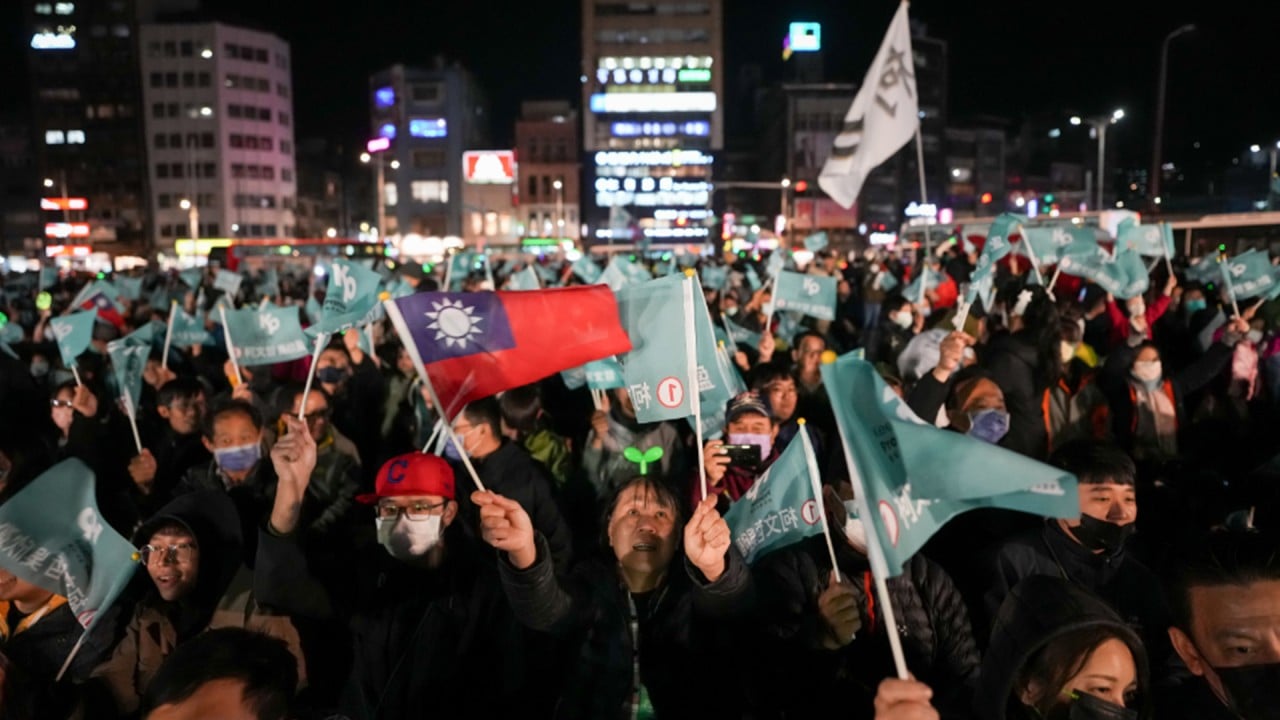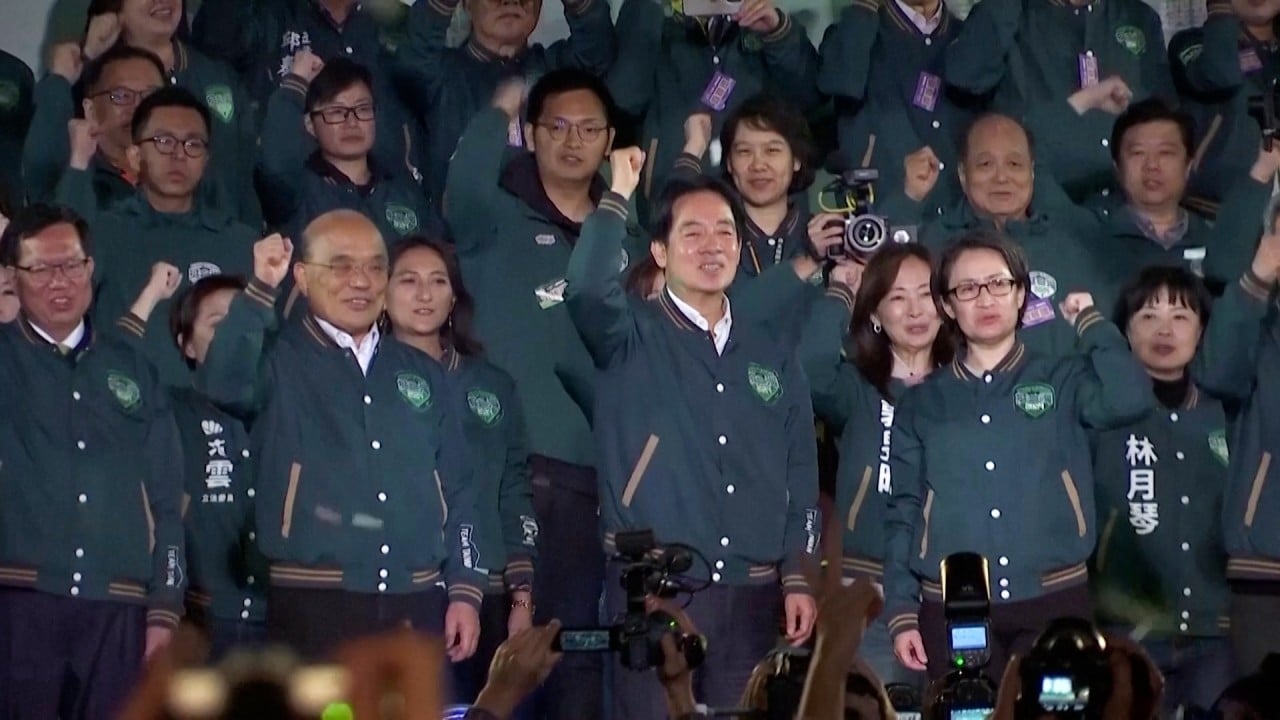
Is Beijing planning further diplomatic isolation for Taiwan in wake of William Lai’s win?
- Nauru’s switch of official recognition after DPP election victory signals mainland China will further squeeze island’s international space
- As Taipei seeks larger global presence, cross-strait frictions will mount, analysts say
Nauru’s change of heart leaves Taipei with just 12 formal allies, including the Vatican. Most countries, including the United States, do not recognise Taiwan as an independent state, but Washington is opposed to any attempt to take the self-governed island by force and is committed to supplying it with weapons.
Li Fei, a Taiwan studies specialist at Xiamen University, predicted that Beijing would further isolate Taiwan internationally if Lai and his independence-leaning Democratic Progressive Party (DPP) continued to shun the “1992 consensus”.
“The key is the recognition of the 1992 consensus. If [the DPP] recognises it, then there may be some room for negotiation [between Taiwan and mainland China]. If they do not recognise it, then it’s impossible [for Beijing to allow Taiwan to have any presence internationally],” Li said.
Yun Sun, director of the China programme at the Washington-based Stimson Centre, said the timing of Nauru’s announcement was “not a coincidence”.
“That means Beijing has a clear plan for punishment and signals for deterrence in the diplomatic front against the DPP now that Lai has won the election,” she said.
In 1992 in Hong Kong, negotiators from Taiwan and the mainland held a pivotal meeting seeking to build a diplomatic basis for semi-official cross-strait exchanges. They eventually agreed after the meeting to adhere to the “one China” principle but there was no consensus on the meaning of “one China”.
Beijing has a clear plan for punishment and signals for deterrence in the diplomatic front against the DPP now that Lai has won the election
Soon after the KMT lost power to the DPP in 2016, Taipei began to walk back its stand on the consensus.
“[Lai] has made it clear that he will follow Tsai Ing-wen’s policy,” Li said.
“[China] will have countermeasures … it will continue to put pressure [on Taiwan]. Countries that have the ‘so-called diplomatic ties’ with [Taiwan] will continue to decrease.”
After Tsai became president, Beijing ramped up pressure on Taiwan’s diplomatic allies, luring them to switch recognition. During her presidency, Taiwan lost 10 diplomatic allies. Beijing also prevented the self-ruled island from taking part in international organisations that require statehood to join.
One most notable case was Taiwan’s application to take part in the World Health Assembly (WHA), an annual meeting held by the World Health Organization (WHO) to discuss global health policies. It was granted observer status from 2009 to 2016 when the KMT’s Ma Ying-jeou was Taiwan’s president, but has since been blocked.
Analysts said they expected Lai’s victory could further strain cross-strait relations since Taiwan – with US help – would keep pushing for a greater international presence. Beijing, which sees such manoeuvres as violations of its one-China principle, would push back with diplomatic and economic deterrents.
Pang Zhongying, an international relations specialist at Sichuan University, said Lai was expected to further push for Taiwan’s participation in international bodies, especially with veteran diplomat Hsiao Bi-khim elected as his vice-president.
Hsiao served as Taipei’s de facto ambassador to the US before she was picked by Lai as his running mate. Hsiao has been vocal about Taiwan’s participation in the UN system, including the ultimate goal of joining the international body under the name of Taiwan.
But Taiwan’s bid for UN participation is doomed, according to Pang.
“It’s impossible for it to join, even under the name of ‘Taiwan’, because more than 170 countries have established ties with China. And there is a principle, a conditionality that Beijing requires them to recognise … that [the People’s Republic of China] is the only representative of China, and Taiwan is part of China,” he said.
Jassie Cheng, a cross-strait relations expert at the Lee Kuan Yew School of Public Policy at the National University of Singapore, said that despite pressure from Beijing, Taiwan could learn from past experience in crafting a “more flexible diplomatic approach”.
Since Taiwan, officially known as the Republic of China (ROC), lost its UN seat in 1971, Taipei has tried various tactics to expand its diplomatic footprint, but its efforts have met with resistance from Beijing.
In the 1990s, Taiwan increased official and unofficial exchanges with nations without using its official ROC title, a strategy that paved the way for its memberships in the World Trade Organization and the Asia-Pacific Economic Cooperation forum, which do not require their members to be sovereign states.
Still, other attempts at international participation, such as Taiwan’s bids to take part in the United Nations General Assembly, and other UN-affiliated bodies such as the International Civil Aviation Organization (ICAO) and Interpol, have been blocked.
As president, Tsai has focused on bolstering ties with the United States while increasing exchanges with other “like-minded” democratic countries, including joining the US-proposed Summit for Democracy that excluded China.
“The rise of transnational challenges, such as the global pandemic, climate change, and human trafficking, presents opportunities for Taiwan as a small to medium-sized nation to leverage its unique strengths,” Cheng said.
Taiwan has full memberships in 45 intergovernmental organisations and multilateral frameworks, most of them focused on the economy. It has also held observer status in 27 such platforms, including the Pacific Islands Forum and the UN Framework Convention on Climate Change, where it is represented by NGO participants.
Beijing has long used a carrot and stick approach towards Taiwan, mixing military deterrence with economic sweeteners or perks to court Taiwanese residents and businesses.
But the “carrots” could be less frequent if the DPP moves further down the path of “non-cooperation”, according to Zhang Baohui, an international affairs professor at Lingnan University in Hong Kong.
Days before the election, the Chinese Ministry of Commerce announced that more preferential tariffs on imports from Taiwan could be suspended after similar measures were slapped on 12 chemical products earlier this month, a move many saw as a warning in the event of a DPP election victory.
Zhang suggested that Nauru’s severing of ties with Taiwan was only “the first” of “various measures” by Beijing, but added they would not have “practical impacts” on the island.
Many observers forecast that US policy towards Taiwan will remain unchanged during Lai’s administration as Washington and Taipei were expected to continue to work closely to counter Beijing.
The US, which has helped Taiwan to expand its presence internationally, and will continue to do so following the DPP’s election victory, according to Douglas Paal, former director of American Institute in Taiwan, the de facto US embassy in Taipei.
Even if Taiwan loses a few more diplomatic allies, it will not greatly affect its overall geopolitical position
“The US, under most administrations, would continue to seek Taiwan’s participation in relevant international organisations, despite Chinese opposition. Beijing expects that, too, though it may protest vocally,” said Paal, a distinguished fellow with the Carnegie Endowment for International Peace.
Beijing slammed Washington multiple times after the US pledged support for Taiwan’s participation in the UN system, cautioning it not to support Taiwan’s pro-independence forces, and warning that the Taiwan issue was a red line not to be crossed in US-China relations.
Pang, from Sichuan University, said the DPP’s victory should warrant a rethink of Taiwan policies by Beijing, Taipei and Washington.
“If the DPP thinks its victory means an encouragement for it to take bigger steps forward towards independence, that is very dangerous,” he said.

 - Kawala Xie.jpg?itok=NogZcyZ-&v=1661304068)

